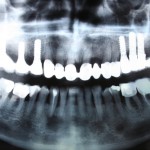
Hybrid prosthesis are those that have a metal substructure with an acrylic covering. The aim of this systematic review was to investigate the short-term (5–10 year mean follow-up) and long-term (10 year or more) survival and success of fixed full arch dental hybrid prosthesis and supporting dental implants.
Methods
Eligible studies included randomized controlled trials, prospective cohort studies, retrospective cohort studies and case-series. They had to be reported in English, German, Korean or Hebrew.
Studies reporting interventions with full-arch fixed dental hybrid prostheses were identified by electronically searching Medline, Web of Science, and the Cochrane Register of Controlled Clinical Trials.
Results
- 18 studies were included in the review. 10 of these were prospective cohort studies and 8 retrospective. No randomized controlled trials were included.
- Sensibly, due to study heterogeneity, a meta-analysis was not attempted.
- Studies with 5-10 year follow up
- Cumulative implant survival rates varied among the 12 short term studies from 87.89% to 100%. However, in one study only 50% of implants were available for review at 5 years and in another only 105 of 968 implants were available at 5 years. Such high drop-outs put these studies at very high risk of attrition bias.
- The most commonly reported prosthetic complications were fracture or loosening of abutments or prosthesis screws, fracture of acrylic resin supra-structures and fracture of acrylic resin teeth.
- Studies with longer than 10 year follow up
- Cumulative survival rates of implants with a longer follow up was between 78.3% and 98.9% in the 6 longer studies. There was high loss to follow up on one study where only 347 of 1099 implants were included in the cumulative survival analysis at 15 years.
- Just 3 of the 18 studies included patient-centred outcomes such as aesthetics or speech. One study found that 42.1% of the participants had speaking problems and 36.8% had aesthetic problems.
Conclusions
The authors conclude
Within the limitation of the current study, implants and full arch fixed dental hybrid prostheses showed rather high short- term survival rates. However, due to limited available literature, their long-term survival rates could not be obtained.
Commentary
This was a fairly well conducted review. The risk of bias of the included studies seems to be high particularly due to the high loss to follow up seen in several of the studies. One problem with a review of the prognosis of one type of intervention is that we don’t know if these survival rates are as good, better or worse than the alternatives.
Links
Kwon T, Bain PA, Levin L. Systematic review of short- (5-10 years) and long-term (10 years or more) survival and success of full-arch fixed dental hybrid prostheses and supporting implants. J Dent. 2014 Jun 26. pii: S0300-5712(14)00163-8. doi: 10.1016/j.jdent.2014.05.016. [Epub ahead of print] Review. PubMed PMID: 24975989

The risk of bias of the included studies seems to be high particularly due to the high loss to follow up observed. http://t.co/eDqdfpourm
SR investigates the short-term and long-term survival and success of fixed full arch dental hybrid prosthesis. http://t.co/eDqdfpourm
Full arch dental hybrid prosthesis and supporting dental implants – survival rates http://t.co/cJsavBzdmj via @sharethis
Implants and full arch fixed dental hybrid prostheses showed rather high short- term survival rates. http://t.co/eDqdfpourm
Commonly reported prosthetic complications were fracture or loosening of abutments or prosthesis screws. http://t.co/eDqdfpourm
Don’t miss: Full arch dental hybrid prosthesis and supporting dental implants – survival rates http://t.co/eDqdfpourm